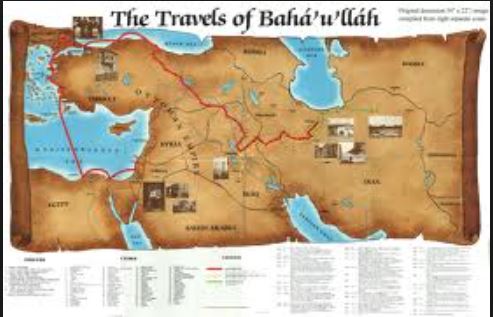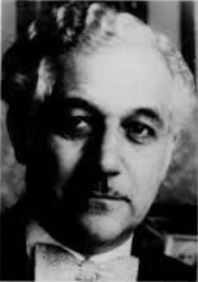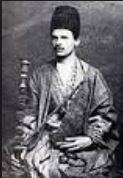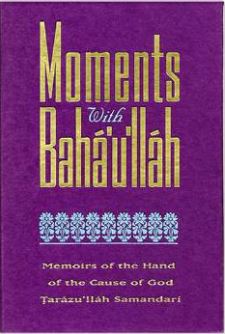
Select Persian, Arabic, Turkish and other non-western recollections and materials about the life, companions and writings of Mirza Husayn `Ali Nuri, Baha'-Allah (b. Tehran 1817-d. Bahji, near Acre [`Akka'] May 29th 1892).
Stephen Lambden UCMerced.
In progress - last updated 22nd April 2015.
There are many thousands of documents that directly or indirectly pertain to the person of the founder of the Baha'i religion, Mirza Husayn `Ali Nuri, Baha'-Allah (b. Tehran 1817-d. Bahji, near Acre [`Akka'] May 29th 1892). They were either written by himself, by his relatives and followers, or by other persons who had something to say about him. Some relevant materials were written by persons who challenged his religious claims. Many, directly or indirectly had something to say about him or about his cultural or religious environment. Most published materials say more about his writings and followers than about his person though the vast amount of biographically related data has yet to be adequately collected together, translated and analyzed or put into historical and theological contexts.
As a repeated prisioner and an exile, it was not always wise or safe for him to be publicly accessible. He lived in Qajar Persia (1817-1853) then for the next forty years in certain regions within the Ottoman Empire; in Ottoman Iraq (Baghdad, etc 1852-1863),Turkey, including the then capital Constantinople-Istanbul (1863), Adrianople-Edirne (1863-1868) and finally `Akka-Acre (and surrounding localities such as Bahji and on occasion Haifa) Palestine (1868-1892). The histories of the houses, towns and countries (along with their diverse populations and inhabitants, etc) where Baha'-Allah resided during the 19th century has yet to be written so as to throw light upon his life, writings and followers. A few of the works listed below contain materials expressive of western hagiographical perceptions of the person of Baha'u'llah.

`Abd al-Baha'-`Abbas Effendi (1844-1921), eldest son of Baha'-Allah and his religious successor.
- Maqāla-yi shakhṣ-ī sayyāḥ ("A Travellers Narrative"), ed. and trans. Edward G. Browne (d.1926), as A Traveller’s Narrative, 2 vols. Cambridge: Cambridge University Press, 1891.
Atrpet, Sargis Mubagajian ( ), an Armenian of Alexandropol who wrote in Russian and Armenian. See Browne, Materials pp. 176-7.
- lmamat: the Country of the Worshippers of the Imams (Persian clergy) = Russian ADD. Alexandropol 1909, 208pp. The second part of this work, entitled Babis and Baha'is, "occupies pp. 87 -208... The treatise on Babis and Baha'is... is illustrated with some remarkable portraits and pictures (I know not how far authentic), including three of the Bab (one suspended for execution) Qurratu'l-'Ayn, one expounding the Scriptures and one just before her execution; one of Baha'u'llah; and one of a Babi being blown from the mouth of a cannon" (so Browne, Materials pp. 176-7).


Hasan M. Balyuzi (b. Shiraz, 1908- d. London Feb. 12th 1980). Son of Mírzá `Ali Áqá and Munavvar Khanum.
- Bahá'u'lláh, A Brief Life: The Word Made Flesh. Two long essays on the life of Baha'u'llah, published in conjunction with the Baha'i Centennial. 1963.
- Bahá'u'lláh, King of Glory. Oxford: George Ronald Pub Ltd, 1st ed. 1980. 2nd ed. 1991. 539+5 pp. Completed June 1979.
- Bahāʾ Allāh : shams-i ḥaqīqat - nivishtah-i Ḥasan Muvaqqar Bālyūzī ; tarjamah az Ingīsī Mīnū S̤ābit. H. M. Balyuzi Oxford : George Ronald, c. 1989.
- Eminent Bahá'ís in the Time of Bahá'u'lláh withsome Historical Background. Oxford: George Ronald Pub Ltd, 1985. 381pp.
Blomfield, Sara, Louisa, Lady [Sitarih Khanum] (b. Ireland, 1859 - d. Dec. 31st, 1939). The second wife to architect Sir Arthur Blomfield and a Baha'i from about 1907.
- The Chosen Highway. 1st ed. London: The Baha'i Publishinbg Trust, n.d. x+265 pp. [c.1940]. Oxford: George Ronald Pub Ltd., 1956, 275pp. Many UK and USA reprints. Introduction by Hasan Balyuzi (dated March 1940) and Preface by David Hofman. This work contains important spoken chronicles by Bahiyya Khanum (sister of `Abd al-Baha') and certain of `Abd al-Baha's daughters, including Munirih Khanum and Tuba Khanum. Part II is entitled `Baha'u'llah' and other parts contain valuable historical and biographical materials. "Sara, Lady Blomfield began to take written notes of the spoken chronicles of the ladies of the Family of Bahá'ú'lláh during her first visit to Haifa in 1922."

Browne, Edward Granville Browne (1862-1926).
Refer : http://www.iranicaonline.org/articles/browne-edward-granville
EGB had a lifelong interest in the life and religion of Sayyid `Ali Muhammad Shirazi (b. Shiraz,1819-d. Tabriz, 1850), the Bab (Gate) as well as the Azali Babi leader, Mirza Yahya Nuri (c. 1830-1913), a half-brother of Baha'-Allah. His many translations from Arabic and Persian, his numerous writings and vast correspondence is, especially in the early years of his post `Year Amongst the Persians', 1887-8 period, often centered on the Bab, his religion or on varieties of the Babi phemonenon. There is yet much that in various ways pertains to Baha'-Allah and his Baha'i followers many of whom were encountered and referred to by Browne as Babis. Browne met both Baha'-Allah and Mirza Yahya on several occasions, wrote pen portraits of them both, and struggled with their conflicting religious teachings and claims. Primarily an academic Persianist he ...
- `The Babis of Persia,” JRAS 21, 1889, pp. 485-526, 881-1009.
- A Traveller's Narrative written to illustrate the Episode of the Báb. [By 'Abd al-Bahā ibn Bahā Allāh.] Edited in the original Persian, and translated into English, with an introduction and explanatory notes, by E.G. Browne. 2 vols. University Press: Cambridge, 1891.
- `Some Remarks on the Babi Texts Edited by Baron Victor Rosen,' JRAS 24, 1892, pp. 259-332.
- `A Catalogue and Description of 27 Babi Manuscripts,' JRAS 24, 1892, pp. 433-99, 637-710.
- “Babiism,” in The Religious Systems of the World, ed., London, ADD 1905
- ERE.
- Materials for the Study of the Babi Religion. Cambridge: Cambrdge University Press, 1918. 380pp. Rep. Cambridge: Cambride University Press, 1961. The first section of this uneven compilation of diverse materials contains historically valuable information about Baha'u'llah written by Muhammad Jawad Qazvini - (who had turned against `Abd al-Baha') = `I. An Epitome of Babi and Baha'i history to A.D. I 898, translated from the original Arabic of Mirza Muhmmad Jawid of Qazwin'. The rest of the book is also worth consulting for scattered historical data pertaining to Baha-Allah, his followers and his writings.
Dahaji, Sayyid Mihdi,
- `Risalih,' Cambridge University Library, Cambridge, Browne Collection, Or. F. 57.
Hamadānī, Mīrzā Ḥusayn
- Tārīkh-i Jadīd, ms., Cambridge University Library, Browne Or. F. 55/9.
- Partial trans. Edward G. Browne as The New History of Mīrzā ʿAlī Muḥammed, the Bāb, Cambridge : Cambridge Univ, Press, 1893; repr. Amsterdam: Philo Press, 1975.
Hajji Mirza Haydar `Ali Isfahani ( )
- Bihjat al-sudur (The Delight of the Hearts). Bombay : 1913.
- Add
- Partial trans. Faizi,
Mirza Jawad Qazvini,
- "Historical Epitome," trans. in E. G. Browne, ed., Materials for the Study of the Babi Religion Cambridge: Cambridge University Press, 1918.
Salmani, Muhammad-`Ali [the Barber].
- My Memories of Bahá’u’lláh, trans. Marzieh Gail. Los Angeles: Kalimat Press, 1982.
Samandari, Tarazu'llah [Taraz-Allah] (b. Qazvin, 1874 d. [aged 93] Sept. 2nd 1968), son of Kazim Samandar (1844-1918), an Apostle of Baha'-Allah. When aged about 17 this writer was for about 6 months with Baha'-Allah whom he saw several times and experienced him revealing sacred verses or writings.


- Moments With Baha'u'llah : Memoirs of the Hand of the Cause of God Tarazu'llah Samandari. Los Angeles: Kalimat Press, 1995. 76pp.

Zarandī, Muhammad, Nabil-i A`ẓam. (d. Acre 1892).
- Tarikh-i Zarandi,
- Ed. Shoghi Effendi, The Dawn-Breakers, Nabil's Narrative of the Early Days of the Baha'i Revelation (1st ed. 1932).
The bulky Persian Tarikh-i Zarandī in a partial English recreated edition and trans;ation by Shoghi Effendi (d.1957), with the title The Dawn-Breakers, Nabil's Narrative of the Early Days of the Baha'i Revelation (1st ed. 1932). This work is a recreation of early Shaykhī and Babi history by the Guardian of the Baha'i religion based upon the huge collection of ms. notes of Zarandī. It opens with two chapter about Shaykhism then the bulk of the book is concerned with the person and religion of the Bab and his followers. Interwoven with these materials are valuable historical and hagiographical insights into the times and person of of Baha'-Allah during the Babi period (1844-1852) and beyond. The original Persian of the Tarikh-i Zaandi has never been published and exists in at least two recensions.
